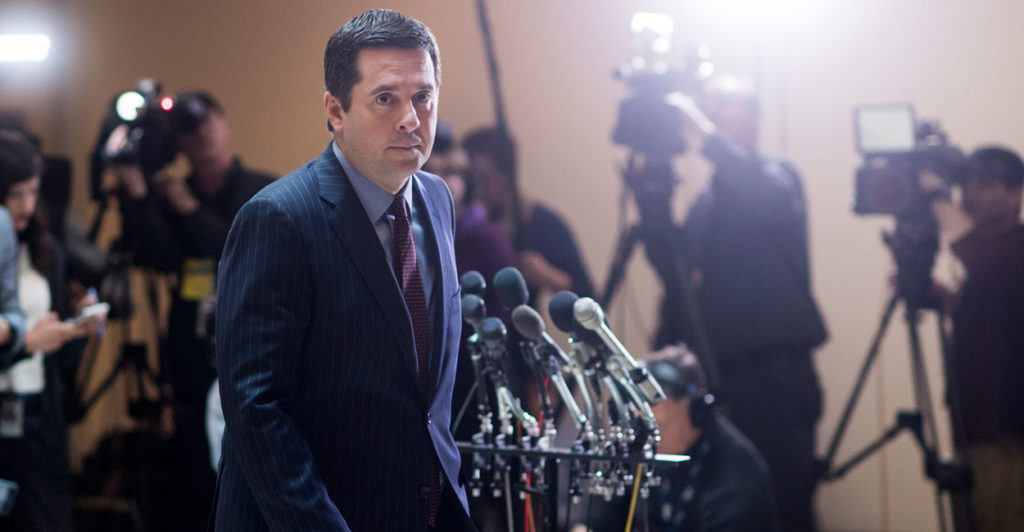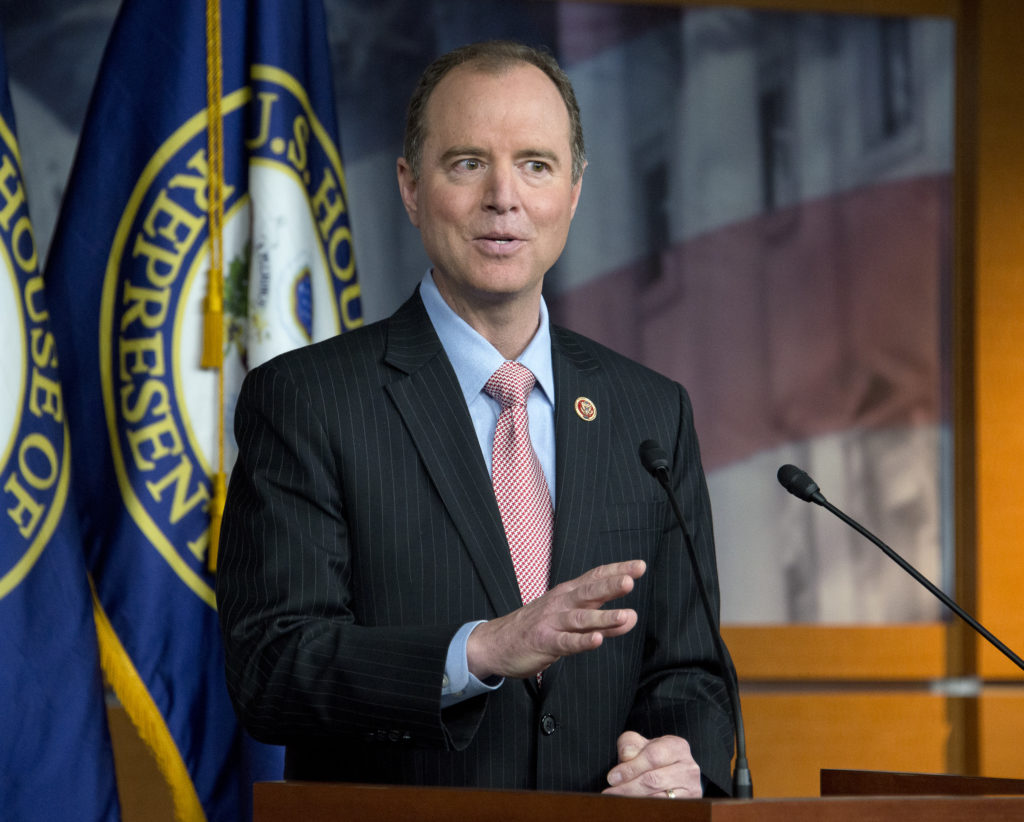The chairman of the House intelligence committee surprised colleagues by saying he has evidence suggesting intelligence agencies may have misused and spread information legally obtained through surveillance of President Donald Trump or those close to him as they communicated with foreigners after the election.
The disclosure Wednesday fed a debate over the government’s surveillance powers and Americans’ privacy that had been renewed by Trump’s unfounded claim that his predecessor “wiretapped” him toward the end of the election campaign.
Rep. Devin Nunes, chairman of the House Permanent Select Committee on Intelligence, said he had no evidence to support Trump’s claim that he was the illegal target of wiretapping last fall ordered by President Barack Obama. The directors of the FBI and the National Security Agency had dismissed those allegations as untrue two days earlier.
Nunes, R-Calif., said communications of Trump or transition team officials may have been swept up by the government as part of “incidental collection”—meaning somebody else was the target.
“What I have read bothers me,” Nunes said, “and I think it should bother the president himself and his team, because I think some of it seems to be inappropriate.”
>>> Who Knew What About Trump Surveillance? New Details Raise More Questions
Such collection of information is permitted by eavesdropping rules that civil liberty advocates long have viewed as overly expansive.
“The most interesting question from a surveillance standpoint is what legal authorities may have been used to obtain communications involving Trump or his aides, and how were those authorities used,” said Elizabeth Goitein, who co-directs the Brennan Center for Justice’s liberty and national security program.
“The statutes are written so broadly and so permissively that there is a lot of room there for mischief,” Goitein told The Daily Signal in an interview. “I have no reason to think anything inappropriate happened in this case, but because the potential for abuse has been built into the statute, it’s certainly a question that comes to my mind.”
‘Raising Awareness’
Indeed, under Section 702 of the Foreign Intelligence Surveillance Act, or FISA, intelligence agencies frequently monitor the conversations of foreigners—including officials with allied or hostile countries—in what supporters view as one of the key government tools to keep the country safe.
Congress approved the provision in 2007. To use this authority, the government must target foreigners. But the surveillance inevitably sometimes captures communications linked to Americans who may be participating in the conversation or being spoken about. This is what’s called “incidental collection.”
Section 702, which expires Dec. 31 along with other portions of the law, is routinely reauthorized. But Republicans in Congress say the questions surrounding Trump and possible surveillance of his team’s communications may prompt them to pursue reforms.
“The publicity associated with what’s going on with Donald Trump is a good thing because it’s raising public awareness of potential abuses of this statute,” said Rep. Blake Farenthold, R-Texas.
Farenthold is a member of the House Judiciary Committee, which recently held a hearing on Section 702.
“When surveillance is too broad, and too many people have access to the data, the chances of abuse skyrocket, whether it’s something politically motivated, as potentially could be the case with the Trump material that’s come out, or some employee in an alphabet soup agency checking up on his or her girlfriend or boyfriend,” Farenthold said in an interview with The Daily Signal.
Judiciary Committee Chairman Bob Goodlatte, in a statement to The Daily Signal, suggested he is open to reforming the law.
“FISA Section 702 is an important national security tool used to disrupt terrorist attacks and protect the American people,” Goodlatte, R-Va., said. “Recent illegal leaks of classified information warrant further congressional oversight of our intelligence agencies and the tools they use in order to determine what additional safeguards may be needed and to secure the trust of the American people.”
>>>Trump Wants Justice Department to Investigate Leakers. How That Works.
Handling Privacy of Americans
To address concerns over Americans’ privacy, the law as currently written requires the government to use “minimization rules” that mask the identity of Americans—but there are exceptions. Government officials may request names to be revealed to help them understand the reports.
The intelligence agencies decide whether to grant the requests.
National Security Agency Director Michael Rogers, in testimony before Nunes’ committee Monday, said 20 people at NSA have this authority. FBI Director James Comey, in the same hearing, would not say how many people in his agency have that power. Comey did say the number is “surely” more than at NSA because FBI agents “come into contact” with U.S. citizens more often.
In a press conference describing his findings about communications potentially involving Trump, Nunes expressed frustration about this aspect of the law. The California Republican questioned the judgment of government officials in requesting identities to be unmasked, and how the intelligence agencies decide to reveal names.

House Intelligence Committee Chairman Rep. Devin Nunes, R-Calif., held a press conference detailing alleged surveillance of conversations involving President Donald Trump or his transition team. (Photo: Bill Clark/CQ Roll Call/Newscom)
Nunes also complained that he too easily could determine the identities of Trump associates—even if their names were masked—from reading reports of intercepted communications.
“I don’t want to get too much into the details, but these were intelligence reports, and it brings up a lot of concern about whether things were properly minimized or not,” said Nunes, who was on Trump’s transition team and is a close ally.
Nunes told reporters that “details with little or no apparent foreign intelligence value” had been “widely disseminated in intelligence community reporting.”
“Finally, I want to be clear, none of this surveillance was related to Russia or the investigation of Russian activities or of the Trump team.”
Rep. Adam Schiff of California, the ranking Democrat on the intelligence committee, dismissed Nunes’ concerns in a briefing with reporters Wednesday. Schiff questioned the chairman’s allegiances at a time when the committee is investigating Russia’s interference in the presidential campaign.
“The chairman informed me that most of the names in the intercepted communications were in fact masked, but that he could still figure out the probable identity of the parties,” Schiff said. “This does not indicate that there was any flaw in the procedures followed by the intelligence agencies. Moreover, the unmasking of a U.S. person’s name is fully appropriate when it is necessary to understand the context of collected foreign intelligence information.”
‘Need More Facts’
Adam Klein, a senior fellow with the Center for a New American Security, said the legal threshold for culling the identity of a U.S. citizen from collected data is relatively low. Klein said it’s impossible to say whether the government properly followed procedures without knowing more about the conversations that Trump or his transition team may have engaged in.
To unmask an American, the law does not require any particular suspicion that the person who is the subject of the request to unmask is engaged in any wrongdoing himself.
“Whether there’s a problem depends on the circumstances of each case—was unmasking based on a need to understand foreign intelligence information, or wasn’t it?” Klein told The Daily Signal. “To make that judgment you’d need more facts, which are classified.”
David Shedd, an acting director of the Defense Intelligence Agency under Obama who also served in the George W. Bush administration, said he had the authority to ask for Americans’ names to be unmasked when he held positions on the National Security Council.

Rep. Adam Schiff, D-Calif., dismissed concerns about alleged surveillance of President Trump or his team as part of routine intelligence collection. (Photo: Ron Sachs/ CNP/Newscom)
Shedd said government officials like himself rarely asked for such names to be revealed, and that it’s usually easy to make out the identity of a person based on the context of a conversation.
“In more than four years, I might have asked for a U.S. person to be unmasked a half a dozen times,” Shedd, now a visiting fellow at The Heritage Foundation, said in an interview with The Daily Signal. “Generally a report does not reach you that has U.S. persons in it. So the numbers are few that you get. Secondly, there wasn’t a need for me to know the U.S. person to understand the gist of the report.”
As an example, Shedd said it would be “legitimate” for the government to be interested in unmasking the name of Michael Flynn within the government after he discussed sanctions with the Russian ambassador weeks before becoming Trump’s national security adviser—as leaks to media outlets have showed occurred.
Because the ambassador, Sergey I. Kislyak, is based in the U.S., his conversations are not covered by Section 702 but another provision of FISA.
“That’s a scenario where I would ask for the U.S. person to be unmasked,” Shedd said of the Flynn case, adding:
Here, at the very same time the Obama administration is trying to decide what U.S. sanctions against Russia should look like, there is someone talking to the Russian ambassador and they are talking about sanctions. I would want to know everything I could.
‘So Much Noise’
Shedd is a fierce defender of Section 702.
He cites a 2014 report from the Privacy and Civil Liberties Oversight Board—a bipartisan executive branch panel—that determined more than one-quarter of NSA reports on international terrorism include information that is based in whole or in part on data collected under the Section 702 program.
That same oversight board report found the government virtually never intentionally misuses the collection authorities when it involves Americans. This means the board has seen little evidence of so-called “reverse targeting,” an illegal activity where the government’s real interest is to collect the communications of an American, regardless of location.
But Shedd said change may be coming to the law as the political winds around the issue have shifted.
“There is so much noise in the system that those of us collectively who are pro-renewal of 702—unchanged—have our work cut out for us,” Shedd said.
Supporters of reform say one thing they’d like to see is for the government to be mandated to report to the Foreign Intelligence Surveillance Court, the so-called FISA court, anytime it incidentally collects information about Americans. The court then would have the authority to issue a judgment on whether the government could retain the information.
Opponents of Section 702 say the government should have to obtain probable cause and a warrant before the FISA court to take any further action on an intercepted report that involves an American.
Under current law, the government does need to establish probable cause to be able to undertake additional surveillance coverage of domestic suspects—beyond what was incidentally collected.
“We should not guess or wonder—the law should explicitly say the government can’t listen to calls, or read emails, without getting a warrant,” said Goitein, the Brennan Center leader. “If we know that, we could all relax a bit.”
Goitein and others propose additional changes to the law. One would narrow the pool of foreigners that the government may legally target for surveillance—thereby limiting Americans who could be caught in the web—to include only those who may pose a threat to U.S. interests.
Congress also could require the circle of officials who can authorize unmasking to be smaller, and tighten the constraints on doing so.
As lawmakers decide how to proceed, longtime opponents of Section 702 are celebrating the newfound public awareness.
“I feel completely vindicated,” said Rep. Thomas Massie, R-Ky., in an interview with The Daily Signal.
Massie has proposed for three years in a row an amendment to Section 702 to prohibit warrantless searches of government databases for information on U.S. citizens.
“It’s always been harder to get Republican votes on this issue, but maybe those come easier now,” Massie said.
This report has been modified to include additional remarks by Nunes.
























